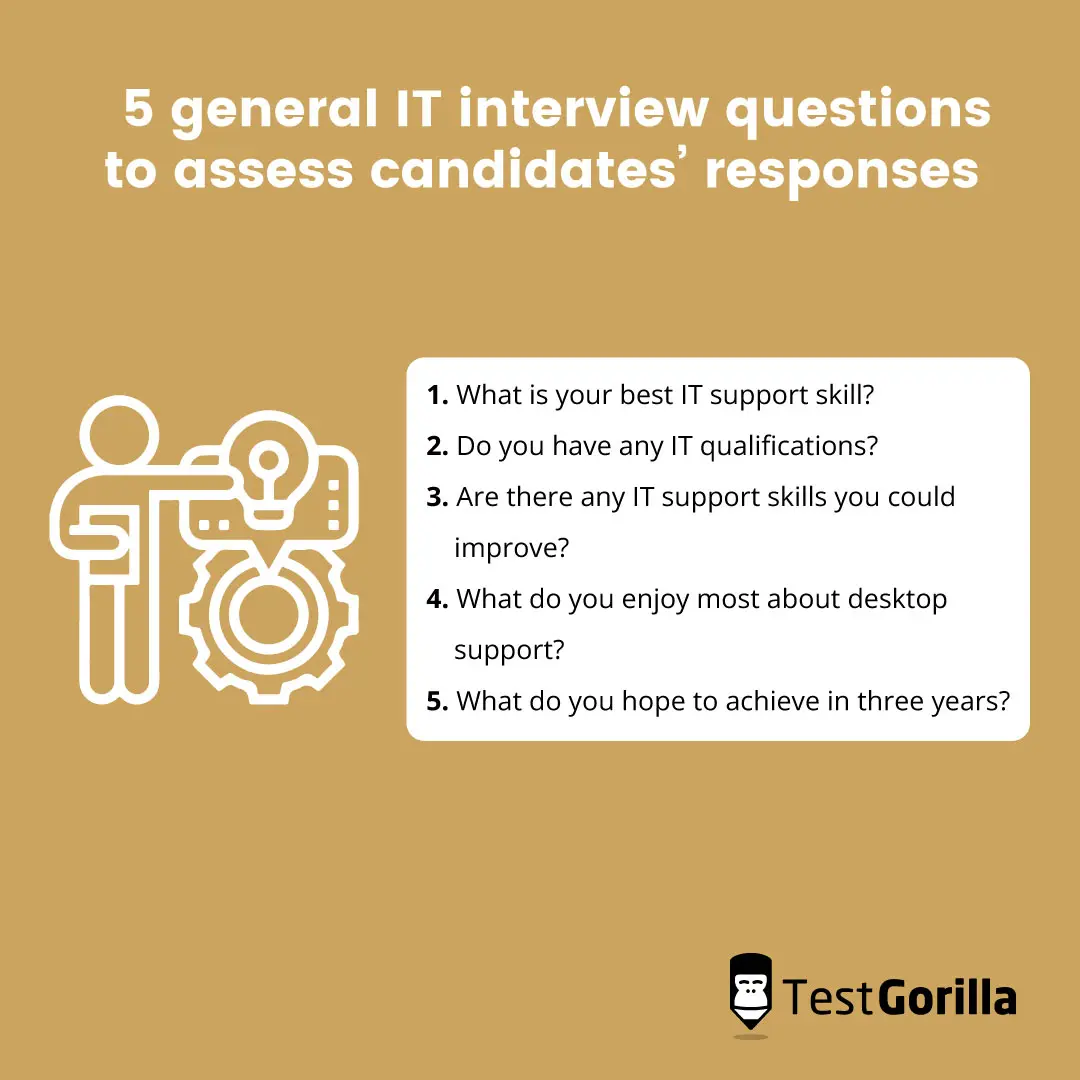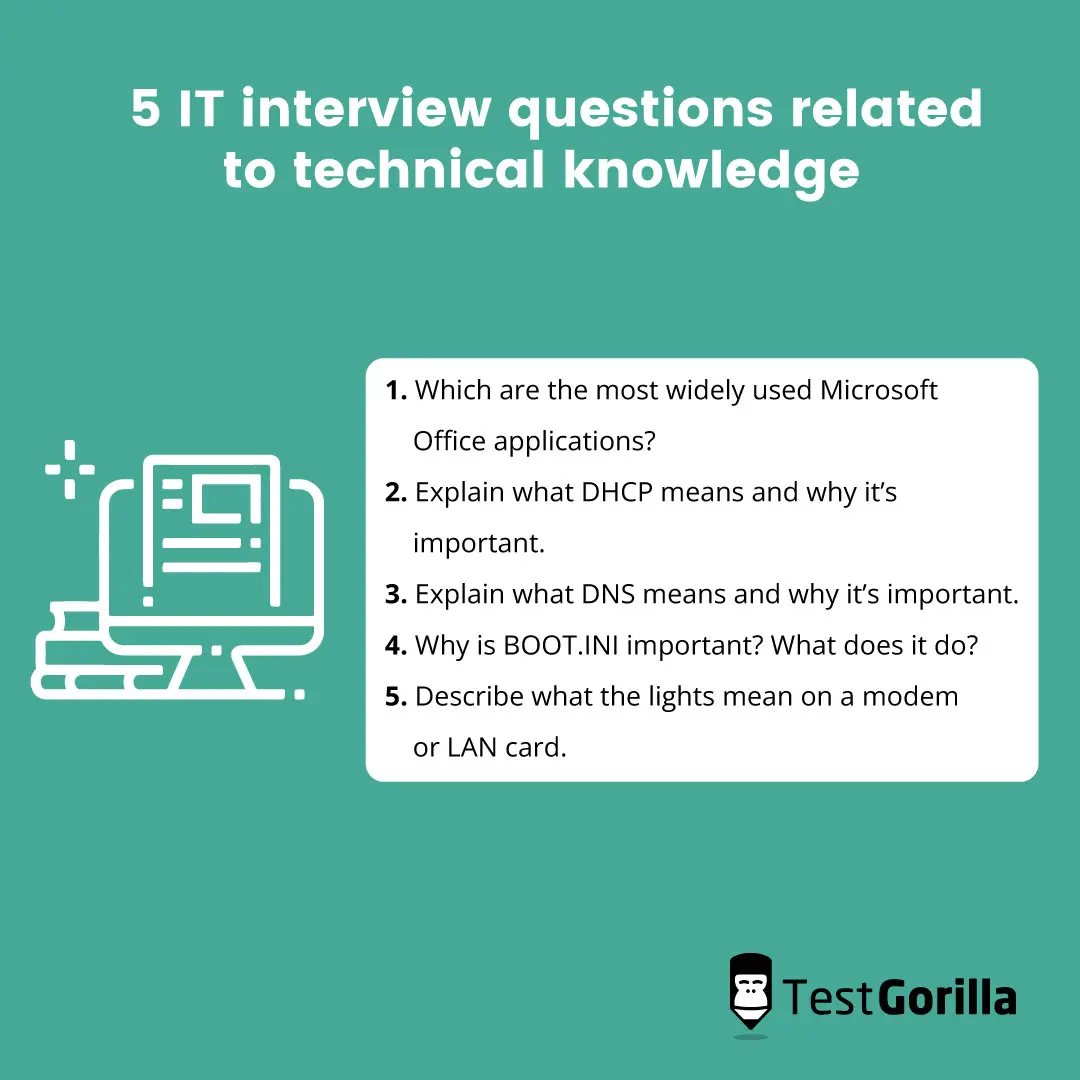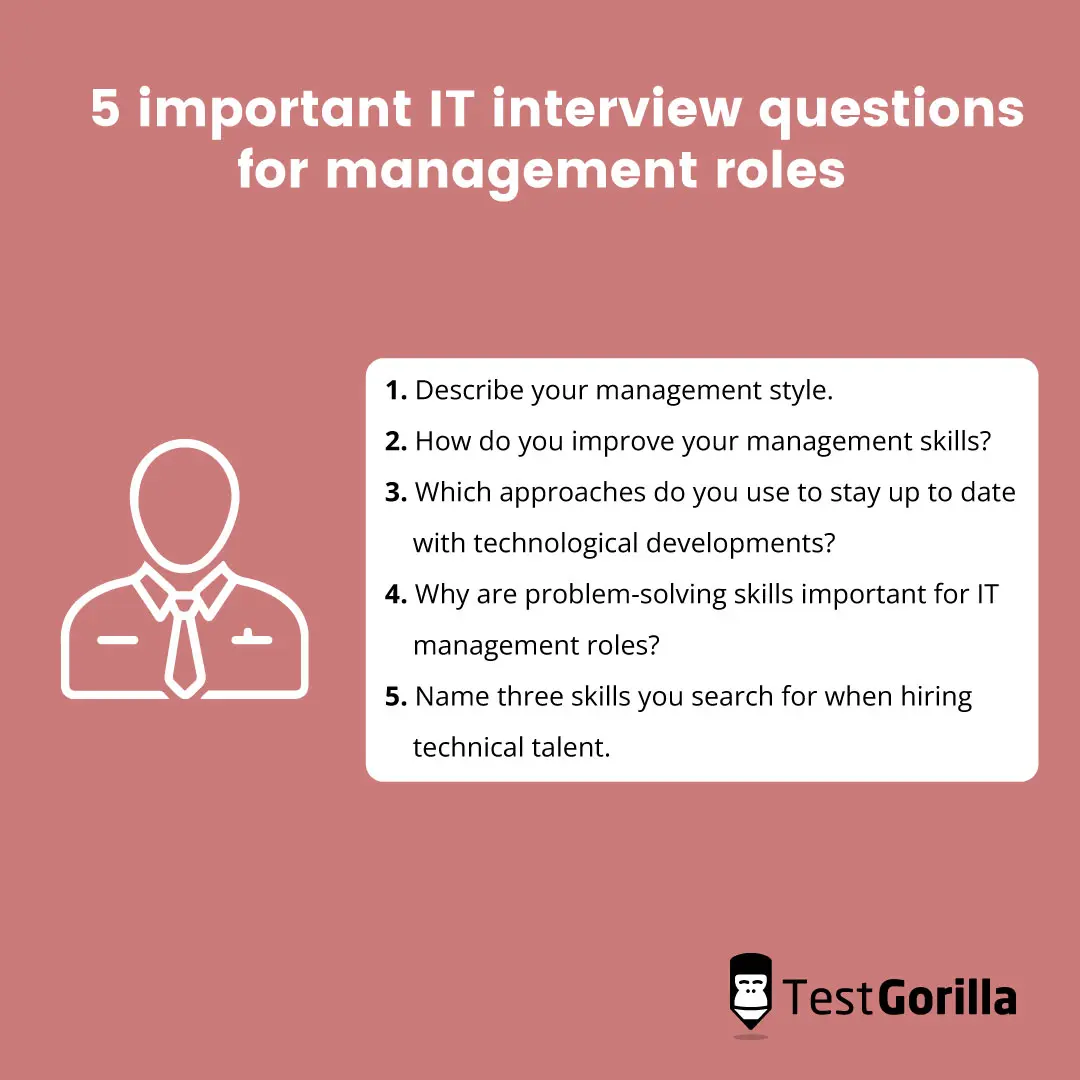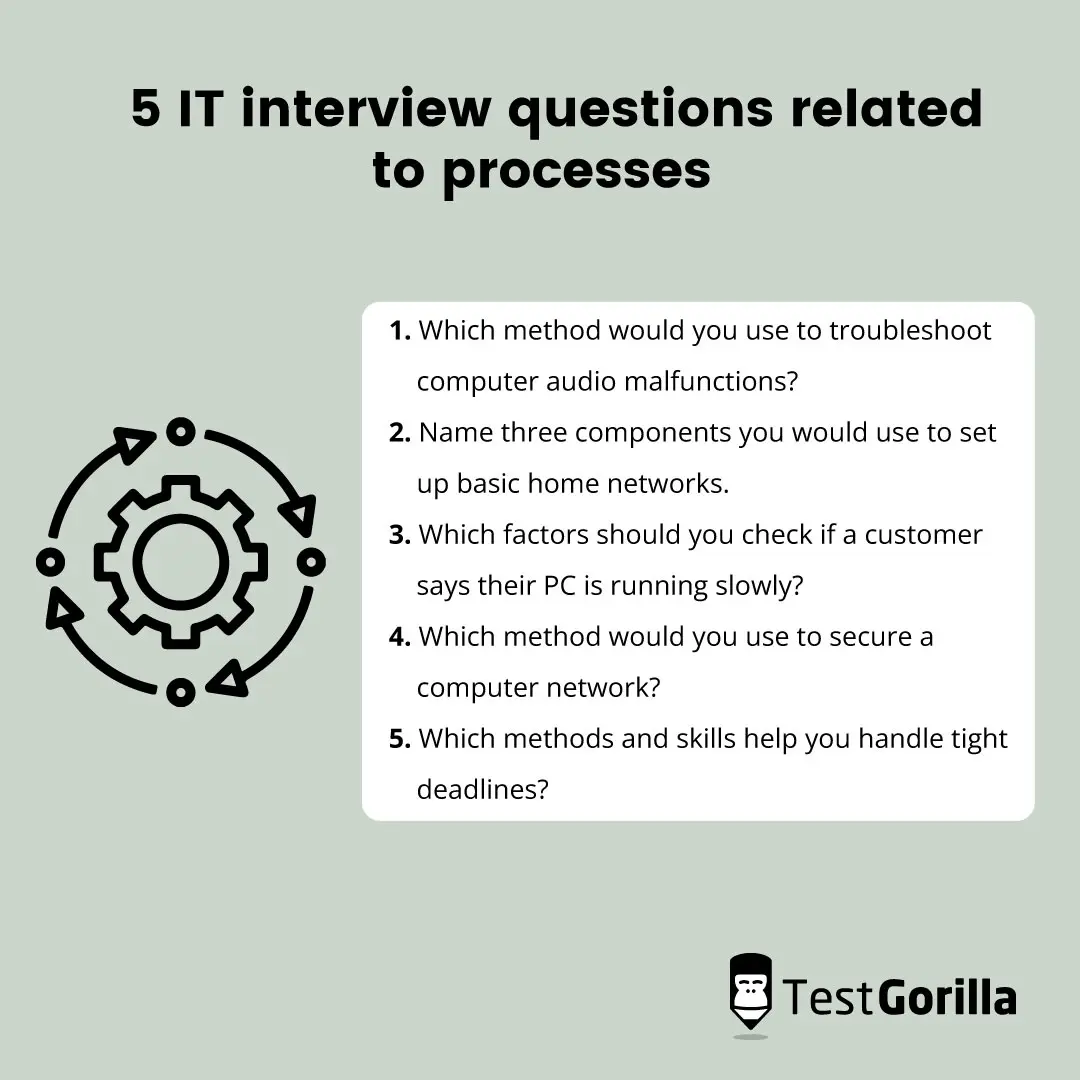Interviewing IT professionals can be difficult – it’s a challenge that requires more than learning about the technical qualifications of the candidates before you.
As an HR professional, making a hiring decision also depends on your ability to analyze and assess your candidates’ soft skills, cognitive fit, desire to improve, specialized experience, and collaborative abilities. But how can you assess all of this? We have the answers.
Inviting talent to complete skills assessments that include a Technical Support Help Desk Representative test will help you learn about applicants’ technical skills, but you shouldn’t stop at this stage.
By completing video interviews or inviting candidates to speak with you in person, you can extend a warm welcome, enhance the candidate experience, and find the perfect match for your business.
Preparing interview questions for IT professionals is the key to a successful interview. But how can you prepare your questions and ensure you make the perfect selection? It’s simpler than you may anticipate. Continue to the list of IT interview questions below to find the top interview topics and learn about your interviewees’ skills.
Table of contents
- 16 general IT interview questions to ask at the start of an interview
- 5 general IT interview questions and answers to assess candidates’ re
- 17 IT interview questions related to technical knowledge
- 5 IT interview questions and answers related to technical knowledge
- IT interview questions for management or team leader roles
- 5 important IT interview questions and answers for management roles
- 5 IT interview questions and answers related to processes
- 5 handy tips for using IT interview questions to hire tech talent
- Find IT professionals and assess their knowledge with IT interview questions and tests
16 general IT interview questions to ask at the start of an interview
Ask IT professionals these 16 general IT interview questions at the start of the interview to encourage them to talk about their experience.
Describe your desktop support experience.
What do you enjoy most about desktop support?
What do you enjoy least about desktop support?
What is your best IT support skill?
Are there any IT support skills you could improve?
What stands out about our organization? Why do you want to work for us?
What do you hope to achieve in three years?
Do you have any IT qualifications?
Have you ever used development tools in your work?
Describe an IT project that was a major success. How did you contribute?
Name a challenging IT project you contributed to. How did you complete it?
Why have you chosen a career in IT?
Explain the advantages of using Agile processes.
Explain the disadvantages of using Agile processes.
Do you work on projects in your spare time? Tell me about them.
Which skills help you work efficiently when not on site?
5 general IT interview questions and answers to assess candidates’ re
Here are five crucial general IT interview questions you can ask applicants and sample answers to assess their responses.
1. What is your best IT support skill?
This general IT interview question will help you determine if your candidate knows which IT support skills can make their work easier and whether they have the skills to join your company.
One of the key IT skills organizations look for is cybersecurity knowledge. This skill is fundamental when it comes to enhancing security for your company’s or clients’ software, so listen for responses that mention why cybersecurity skills are important.
Of course, candidates may mention many other skills when responding to this question, so reviewing multiple skills with an IT skills assessment that features a Cybersecurity skills test is worthwhile.
2. Do you have any IT qualifications?
Though qualifications are important for IT support staff, it’s not always a red flag if an applicant doesn’t have a college degree.
IT qualifications prove your applicant has dedicated a substantial amount of time to learning about the IT industry. This shows they have the drive and motivation to develop new skills.
But a degree is not the only marker of success in this industry. Don’t forget to consider other factors when assessing an applicant, including their years of experience in the field, the projects they have completed, and their skills.
3. Are there any IT support skills you could improve?
Being skilled in all aspects of IT support may not be possible for every candidate, but knowing how to hone one’s skills is one way to increase proficiency and ability.
Whether your applicant needs to improve their Windows server administration skills or operating system knowledge, a commitment to upskilling can lead to better-quality projects.
Look for responses that show that candidates have self-awareness, know what they need to improve, and understand how to improve it.
It’s useful to ask applicants to complete IT skills assessments that include relevant tests (such as a Windows Server Administration test) to assess their knowledge before the interview. You can give the same skills tests to your employees after they’ve worked for your organization for a while to determine whether they’ve improved their skills.
4. What do you enjoy most about desktop support?
The demand for enthusiastic, skilled professionals is high: Around 75,000 openings are projected yearly for IT support specialists. If your organization is looking for an IT support expert to fill one of these roles, checking whether applicants are passionate about this role is critical.
Applicants may explain that they enjoy network support work or authentication duties. They might provide examples of how they have handled these responsibilities in their current roles and explain why they enjoy completing them – the key here is to look for genuine passion and interest.
5. What do you hope to achieve in three years?
By asking this IT interview question, you can determine whether your applicant hopes to improve their skills, ascend to a higher-level position, and remain working for your organization.
Be wary of applicants who provide vague answers that suggest a lack of loyalty or ambition, and ask follow-up questions to gauge their passion for the role.
For instance, if your applicant mentions that they hope to transition from a freelance IT support technician to a managerial role, ask them which aspects of management appeal to them.
17 IT interview questions related to technical knowledge
Ask interviewees these 17 IT interview questions to test their technical knowledge and determine if their IT support experience suits your expectations.
Name two recently released CPUs.
Explain what USB means and its purpose.
Tell me about a desktop operating system you have used.
Explain what hard-disk partitions are.
Explain what RAM is.
Explain what ROM is.
Explain the difference between RAM and ROM.
Describe what the lights mean on a modem or LAN card.
Name three common computer ports.
Explain what DHCP means and why it’s important.
Explain what DNS means and why it’s important.
Which are the most widely used Microsoft Office applications?
Name two Windows XP versions.
Why is BOOT.INI important? What does it do?
Name two examples of firewalls.
Explain what IP addresses are.
Explain what VPNs are.
5 IT interview questions and answers related to technical knowledge
Use these five important technical IT interview questions and sample answers to make reviewing candidate responses easier.
1. Which are the most widely used Microsoft Office applications?
Candidates with excellent technical knowledge will know which Microsoft Office applications are most common. They should mention four applications: Microsoft Excel, Microsoft Outlook, Microsoft Word, and Microsoft PowerPoint.
Candidates who are keen to impress may also explain the functions of these applications and why users consider them important. If you want to verify your applicants’ Microsoft Office applications knowledge, look no further than our Microsoft Office skills tests.
2. Explain what DHCP means and why it’s important.
Asking applicants about DHCP protocols is a great way to assess their technical knowledge.
To gauge your applicants’ experience and knowledge, listen for answers that give a precise definition. Applicants should mention that DHCP stands for Dynamic Host Configuration Protocol, which provides an address to an Internet Protocol (IP) host.
Top-level candidates may also explain that DHCP works as an internet engineering task force and provides configuration information to hosts from a server.
3. Explain what DNS means and why it’s important.
Experienced applicants should know that DNS refers to the Domain Name System. This naming system translates human-readable domain names into their corresponding IP addresses.
This means users can access websites by inputting simple domain names rather than numerical IP addresses, making internet browsing easier.
4. Why is BOOT.INI important? What does it do?
Good answers to this IT interview question will explain that BOOT.INI is a text file that contains configuration options for the boot process in older Windows computers. When the system first starts, the file displays the operating systems the user can load and their boot configurations.
5. Describe what the lights mean on a modem or LAN card.
Common modem or LAN card problems your clients may encounter include miscommunication with the router and outdated equipment, so it’s crucial to hire IT professionals who understand the inner workings of these technologies.
Candidates should know what to look for when troubleshooting common modem issues. Asking this question can help you assess their knowledge and skills in this area.
Thorough answers will mention what the four main lights do:
Data light: tells users whether the internet is functioning correctly on the device
Connectivity light: shows whether the modem is linked to the computer
Power light: shows that the power is on
Link light: indicates whether the modem is currently receiving broadband signals
IT interview questions for management or team leader roles
If you’re hiring an IT professional for a management or team leader role, ask these IT interview questions during the interview.
Describe your management style.
Name three skills you search for when hiring technical talent.
How do you improve your management skills?
Name some key trends that will affect the IT industry.
Describe a time you had to fire an employee. How did you handle the situation?
What do you consider to be a difficult IT support duty?
Which approaches do you use to stay up to date with technological developments?
How would your team describe your motivation strategies?
How do you handle project delegation responsibilities?
Why are problem-solving skills important for IT management roles?
5 important IT interview questions and answers for management roles
Here are five important IT interview questions and answers for management roles to guide you when reviewing your candidates’ responses.
1. Describe your management style.
Research suggests that there are four primary leadership styles in business: coaching, democratic, visionary, and transformational. Applicants may mention one or more of these management styles when responding to this interview question.
One way to evaluate your candidates’ responses is to consider whether their management style aligns with your organization’s values.
If your company values constant upskilling, consider whether your applicant prefers a coaching approach to management. Or, if your team culture is democratic, listen for responses that refer to a democratic leadership style that involves prioritizing a diverse range of ideas.
2. How do you improve your management skills?
Whether they rely on management training or courses, IT support managers should consider ways to improve their managerial abilities. Enhancing one’s management skills can make it easier to delegate IT projects efficiently, increase the team’s motivation, and manage IT systems more effectively.
Listen for answers that show your candidates’ desire to learn new skills after inviting them to complete a Leadership & People Management test. This approach ensures that you combine quantifiable and qualifiable candidate assessment methods for an effective candidate review process.
3. Which approaches do you use to stay up to date with technological developments?
Some standard approaches IT professionals use to stay updated with technological developments include reading forums and completing courses.
But enthusiastic candidates may mention some more inventive methods, from completing personal projects to taking part in hackathons to joining conferences and seminars. Make sure to ask for specific examples to encourage candidates to show off their experience and skills.
Many trends are transforming the IT industry, such as the Industrial Internet of Things (IIoT), which research suggests 50 billion devices will link to by 2025.
Candidates who aim to prove they are up to date with modern technology may mention some developments like these when they respond to this question. This shows that they have their finger on the pulse of the industry
4. Why are problem-solving skills important for IT management roles?
Problem solving is an important skill for IT management because it helps enhance team cohesion, workflow, project delegation, and timely delivery of projects. Applicants may explain the importance of these benefits by discussing a project they completed and how problem solving made the process easier.
For instance, when delegating projects involving cybersecurity enhancements to an IT team, applicants may use problem-solving subskills to determine which team member is ideal for these responsibilities. Once again, make sure you ask for specific examples to back up statements and claims.
If you require additional evidence to determine whether your applicants have suitable problem-solving skills, use our Problem Solving skills test in an IT skills assessment before the interview.
5. Name three skills you search for when hiring technical talent.
IT managers with recruitment responsibilities may look for a range of soft skills and hard skills when assessing technical talent.
Candidates may mention that communication, time management, and attention to detail are key skills that help new employees collaborate with others or avoid mistakes and that technical skills are fundamental to completing IT projects successfully.
5 IT interview questions and answers related to processes
Ask these five IT interview questions related to processes, and check the following sample answers to learn about your candidates’ approaches to IT project support.
1. Which method would you use to troubleshoot computer audio malfunctions?
Ask candidates this IT interview question to analyze their technical knowledge and learn if their methods align with your expectations. Applicants may respond with several methods, such as checking the speaker volume, looking at the cable connections, and assessing the device drivers.
2. Name three components you would use to set up basic home networks.
Candidates with experience will mention several components they use when setting up basic home networks. Some examples of important components are LAN cables, LAN cards, and a router.
A more in-depth answer will explain why the components are important in the context of basic home networks and the purpose of each one.
3. Which factors should you check if a customer says their PC is running slowly?
Many factors can cause a computer to run slowly. Your candidates’ responsibilities are to use critical thinking and troubleshoot these issues.
Applicants who want to show their experience may explain that viruses, a lack of disk space, and issues with the computer’s overall performance are fundamental factors to check in this situation.
If you want to check their critical-thinking skills, you can assess them easily with a Critical Thinking test.
4. Which method would you use to secure a computer network?
Since cybercrime costs have risen by 10% in 2022, securing computer networks is a vital skill IT support professionals require to prevent and resolve security breaches.
Applicants should be familiar with network security methods and may provide a few examples, such as implementing firewalls and virtual private networks. They may also explain that strong passwords and regular software updates are good approaches to securing a network.
5. Which methods and skills help you handle tight deadlines?
IT professionals often have limited time to complete projects. To handle tight deadlines, candidates require excellent time management. Whether they use systematic troubleshooting approaches or innovative, quick-thinking methods, applicants should be able to transition to each project within a reasonable time.
Check your applicants’ time-management skills with a Time Management test, and ask a follow-up question in the interview related to missed deadlines to learn more about their abilities. For example, you could ask how they manage their time or what they would do if faced with an impending deadline and multiple projects.
5 handy tips for using IT interview questions to hire tech talent
We have reached the end of our 48 IT interview questions list, but be sure to check out the following five tips below before interviewing applicants.
1. Conduct interviews after giving candidates skills assessments
The advantage of using skills assessments before conducting interviews is that it can help you narrow down your applicant pool since you can determine who to invite to the interview by checking precise data.
If you instead complete interviews after screening resumes, you may overlook top talent by relying on an outdated and inaccurate hiring method.
Use skills assessments after posting your job ad and sourcing IT professionals to prioritize quantifiable, measurable data when reviewing skills.
2. Use the right IT interview questions for your talent
If you’re hiring for an IT manager role, using only IT interview questions on individual team member contributions doesn’t make sense. Similarly, if you’re just beginning the interview, starting with technical questions is not the best approach.
To enhance the candidate experience, ensure you use the correct types of IT interview questions based on the interview stage or the talent you’re interviewing. For example, reserve managerial IT interview questions for manager roles or general questions for the beginning of the interview.
3. Ask candidates both situational and technical questions
Asking your candidates a mix of situational and technical questions will ensure that you receive a wide range of data on their traits and IT skills.
Avoid focusing on only technical or behavioral questions. When you transition to a different type of IT interview questions, inform applicants about the switch.
4. Avoid predictable, closed-ended questions
If you ask a standard IT interview question and receive a short answer in reply, ensure that you ask additional follow-up questions that prompt a more detailed response. Predictable interview questions may yield predictable responses, so make all your questions count and dig deeper.
Asking closed-ended questions may also yield “yes/no” responses that don’t tell you much about the candidate’s skills or passion for the role. For example, say that you ask, “Do you enjoy IT support work?” In this case, your applicant may not elaborate much on the aspects of IT support they enjoy.
A more open follow-up question will encourage them to give you more information and provide you with a better idea of the best person to hire.
To get the most from candidates during an interview, avoid closed-ended questions.
5. Use the interview as an information exchange process
Candidates interested in becoming part of your organization should be genuinely curious about your business and may have questions about your company’s ethos. Exchange information with your candidate to enhance the candidate experience by allowing them to ask you questions.
Leave plenty of time for candidates to ask questions toward the end of the interview. This part of the process requires you to be prepared with accurate, up-to-date information about your company, enabling you to sell the perks of working there.
Find IT professionals and assess their knowledge with IT interview questions and tests
Enhancing the candidate experience and assessing candidates’ abilities may seem challenging when hiring IT professionals, but you can solve this problem with suitable hiring methods. Combining IT assessments and interview questions is a verified and reliable approach you can use to hire an expert.
For tips on building a skills assessment with TestGorilla, visit our website. Once you have the information you need, why not try it for free?
TestGorilla is the ultimate candidate assessment platform. Discover the benefits of unbiased candidate assessment today – make your IT assessment in just a few minutes to hire the right professionals for your business.
Related posts
Hire the best candidates with TestGorilla
Create pre-employment assessments in minutes to screen candidates, save time, and hire the best talent.
Latest posts
The best advice in pre-employment testing, in your inbox.
No spam. Unsubscribe at any time.

Hire the best. No bias. No stress.
Our screening tests identify the best candidates and make your hiring decisions faster, easier, and bias-free.
Free resources
This checklist covers key features you should look for when choosing a skills testing platform
This resource will help you develop an onboarding checklist for new hires.
How to assess your candidates' attention to detail.
Learn how to get human resources certified through HRCI or SHRM.
Learn how you can improve the level of talent at your company.
Learn how CapitalT reduced hiring bias with online skills assessments.
Learn how to make the resume process more efficient and more effective.
Improve your hiring strategy with these 7 critical recruitment metrics.
Learn how Sukhi decreased time spent reviewing resumes by 83%!
Hire more efficiently with these hacks that 99% of recruiters aren't using.
Make a business case for diversity and inclusion initiatives with this data.





















